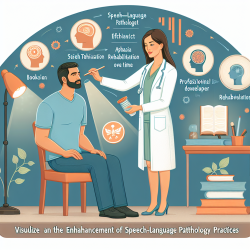Introduction
In the realm of speech-language pathology, data-driven decision-making is paramount. By leveraging research and empirical evidence, practitioners can enhance their therapeutic approaches and outcomes. The study "Managing Addiction and Overdose Deaths: The Debate Over America’s Safe Injection Spaces" provides valuable insights that can be translated into the field of speech-language pathology, particularly in creating environments conducive to positive outcomes for children.
Understanding the Research
The research highlights the impact of supervised drug injection sites (SDISs) in reducing overdose deaths and the transmission of blood-borne diseases. These sites offer a controlled environment where individuals can inject drugs under medical supervision, significantly reducing the risk of overdose and disease transmission. The data indicates that in New York City alone, SDISs reversed 114 overdoses within two months, showcasing their effectiveness.
Translating Insights to Speech-Language Pathology
While the context of SDISs may seem unrelated to speech-language pathology, the underlying principles of creating a safe, supportive, and data-informed environment are universally applicable. Here are some strategies practitioners can adopt:
- Create a Safe Environment: Just as SDISs provide a secure space for drug users, speech-language pathologists can create a welcoming and non-judgmental environment for children. This includes ensuring that therapy sessions are conducted in spaces that are physically safe and emotionally supportive.
- Utilize Data-Driven Approaches: The success of SDISs is rooted in empirical data. Similarly, speech-language pathologists should rely on data to guide their interventions. This means regularly assessing and analyzing a child's progress and adjusting strategies based on evidence.
- Collaborate with Stakeholders: SDISs involve collaboration between healthcare providers, community organizations, and policymakers. In speech-language pathology, collaboration with parents, teachers, and other professionals is crucial to ensure comprehensive care for the child.
Encouraging Further Research
The research on SDISs underscores the importance of continuous evaluation and adaptation. Speech-language pathologists should be encouraged to engage in ongoing research and professional development. By staying informed about the latest studies and methodologies, practitioners can refine their techniques and improve outcomes for children.
Conclusion
Incorporating data-driven strategies and creating supportive environments are key to enhancing outcomes in speech-language pathology. By drawing parallels from the success of supervised injection sites, practitioners can adopt similar principles to foster positive changes in their practice. For those interested in delving deeper into the research, I encourage you to read the original paper: Managing Addiction and Overdose Deaths: The Debate Over America’s Safe Injection Spaces.










